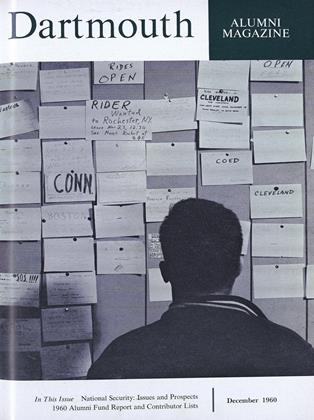By Jerome G. Kerwin '19.Garden City: Hanover House, 1960. 192pp. $3.50.
It is usually the poets who ask us to jump in medias res, but readers of this compact and lucid study will also be well advised to begin in the middle, for there is the clue to Professor Kerwin's method (pp. 82-85).
As a professor of government and a social scientist Mr. Kerwin has a properly professional approach to the problem of Church and State: "The variety of relationships between church and state found throughout the world today indicates the various answers that are given to the problem, and the answers arise from social experience, history, and the genius; of a people." And as & thinker who is also a Catholic, Mr. Kerwin suitably adopts the intellectual viewpoint of the perennial philosophy with its Christian modifications. He does not "deny to the state a place of great dignity worthy of man's service and devotion. Without it he could not live. Or as Aristotle put it, he would have to be a beast or a god to live without it." But he sees with the Thomists and Jacques Maritain that ordination to a good transcending the common good of political society and of the universe, as proclaimed in the Christian message, is necessary to protect the dignity of the human person from subordination to the state. And it is this ethical-religious perspective which enables the author, in his fourth and fifth chapters, to give such an informative elucidation of the relation of the Constitution to its amendments, of one amendment to another, of national law to the laws of the states, and of legislation to administration. Nowhere have I seen a better presentation of the complexities and confusions of the law.
Mr. Kerwin is not a professional historian of ideas, so one can hardly expect an equal expertise in his initial chapters on the development of the theory of Church and State. Before a second edition is published, I would suggest, however, that the author might take account in his treatment of Locke of the recently rediscovered Essayson the Law of Nature and that in his treatment of Calvin he subordinate the emphasis on Christian martyrdom to the very explicit view of the Iron Man of Geneva that God raises up some of his servants as public avengers and arms them with his commission to punish unrighteous domination (Institutes, IV, xx, 30).
The concluding chapters of the book contain a wealth of material illustrating the diversity within Catholic life, including the delightful tale of the graduate-student priest in a Department of English who called the local chancery to find out if it was all right to read a book on the Index. "He had scarcely time to say what the book was before a voice came back: 'lf against faith, Father, no; if against morals, yes.' "
The trouble with American Catholics is the trouble with all Americans, with all of us who live in a technological-literate age. We treat instructions from anywhere — be it Rome or the Bureau of Internal Revenue or Madison Avenue - with an unsuitable strictness of interpretation, instead of "respectfully as a general principle" (p. 185).
 View Full Issue
View Full Issue
More From This Issue
-
 Feature
FeatureNATIONAL SECURITY: Issues and Prospects
December 1960 By LOUIS MORTON, -
 Feature
FeatureINSTITUTIONAL PURPOSE in the Undergraduate College
December 1960 -
 Feature
FeatureUNDERWATER TREASURE
December 1960 -
 Feature
FeatureThe Man Behind the Figures
December 1960 -
 Feature
FeatureALUMNI FUND ENDOWMENT FUNDS
December 1960 -
 Feature
FeatureCollege's Annual Outlay Now Totals $12 Million
December 1960
T.S.K. SCOTT-CRAIG
-
 Books
BooksTHE WAY OF LAO TZU.
JUNE 1964 By T.S.K. SCOTT-CRAIG -
 Books
BooksREFLECTIONS ON THINGS AT HAND, THE NEO-CONFUCIAN ANTHOLOGY, COMPILED BY CHU HSI & LÜ-CHTEN.
NOVEMBER 1967 By T.S.K. SCOTT-CRAIG -
 Books
Books"SPEAK THAT I MAY SEE THEE!": THE RELIGIOUS SIGNIFICANCE OF LANGUAGE.
OCTOBER 1968 By T.S.K. SCOTT-CRAIG -
 Feature
FeatureMarshall T. Meyer '52 on T.S.K. Scott-Craig
NOVEMBER 1991 By T.S.K. Scott-Craig
Books
-
 Books
BooksTHAT FAR PARADISE.
May 1960 By ALLEN R. FOLEY '20 -
 Books
BooksMount St. Helens at al
MARCH 1982 By Bliss K. Thorne '38 -
 Books
BooksIN CLEAN HAY.
January 1954 By MAUDE D. FRENCH -
 Books
BooksNEW HAMPSHIRE TOWN NAMES AND WHENCE THEY CAME.
JUNE 1971 By ROBERT S. MONAHAN '29 -
 Books
BooksNEW YORK IN THE CRITICAL PERIOD,
March 1934 By Wayne E. Stevens -
 Books
Books"The Survival Value of Christianity"
June, 1926 By William Kilborne Stewart
T.S.K. SCOTT-CRAIG
-
 Books
BooksTHE WAY OF LAO TZU.
JUNE 1964 By T.S.K. SCOTT-CRAIG -
 Books
BooksREFLECTIONS ON THINGS AT HAND, THE NEO-CONFUCIAN ANTHOLOGY, COMPILED BY CHU HSI & LÜ-CHTEN.
NOVEMBER 1967 By T.S.K. SCOTT-CRAIG -
 Books
Books"SPEAK THAT I MAY SEE THEE!": THE RELIGIOUS SIGNIFICANCE OF LANGUAGE.
OCTOBER 1968 By T.S.K. SCOTT-CRAIG

